Internship Reflection: Addressing Challenges in a Healthcare Setting
VerifiedAdded on 2023/04/26
|5
|902
|54
Essay
AI Summary
This reflective essay discusses the challenges encountered during an internship at XYZ healthcare organization, focusing on lack of team support, an authoritative supervisor, and language barriers. The author reflects on feelings and experiences associated with these challenges and proposes solutions such as fostering better relationships with team members, being more proactive in seeking information, and utilizing alternative communication methods to bridge the language gap. The essay concludes that these challenges, while stressful, provide opportunities for personal and professional growth through reflection and adaptive problem-solving. The references cited support the importance of reflection in learning and professional development.
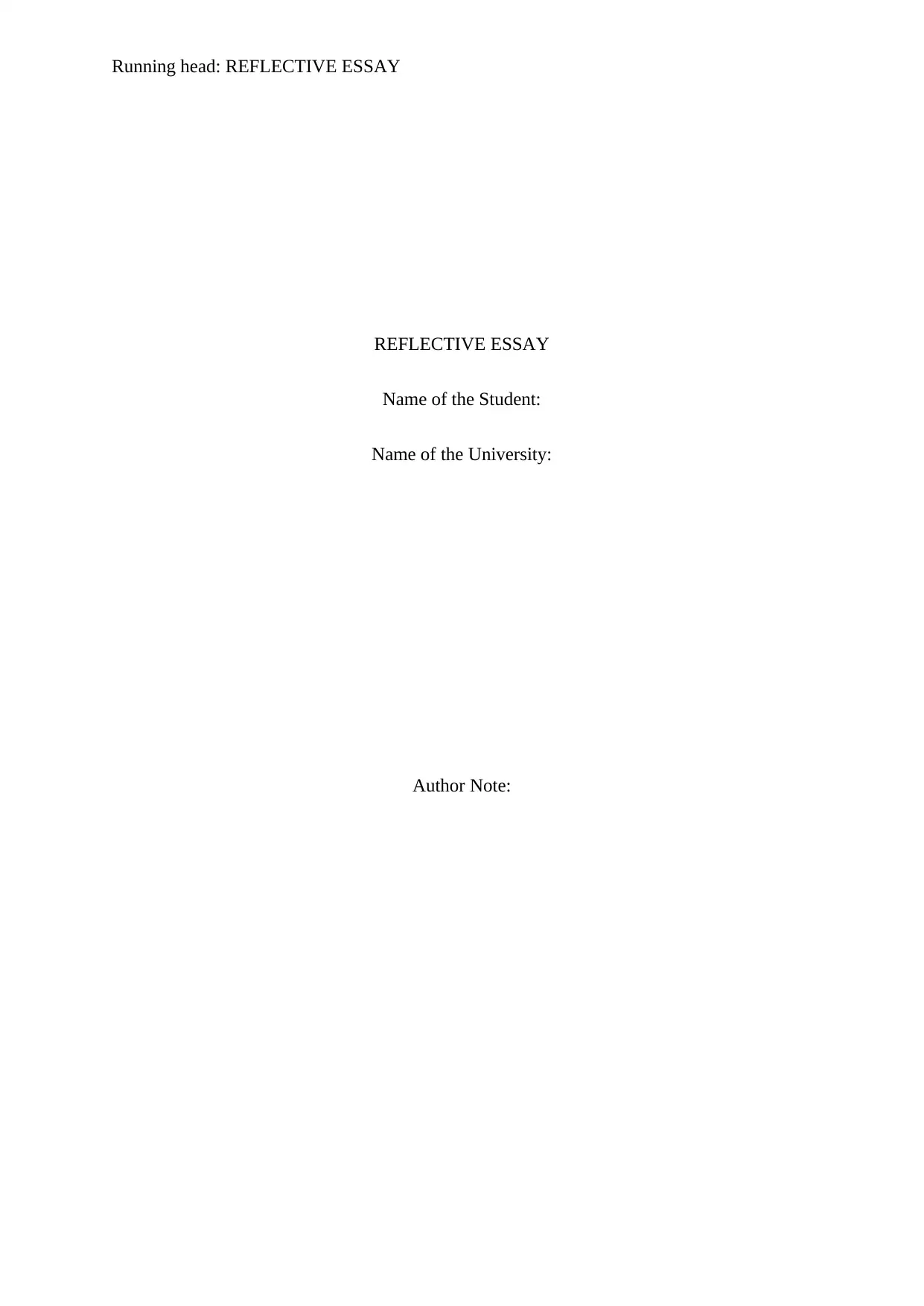
Running head: REFLECTIVE ESSAY
REFLECTIVE ESSAY
Name of the Student:
Name of the University:
Author Note:
REFLECTIVE ESSAY
Name of the Student:
Name of the University:
Author Note:
Paraphrase This Document
Need a fresh take? Get an instant paraphrase of this document with our AI Paraphraser
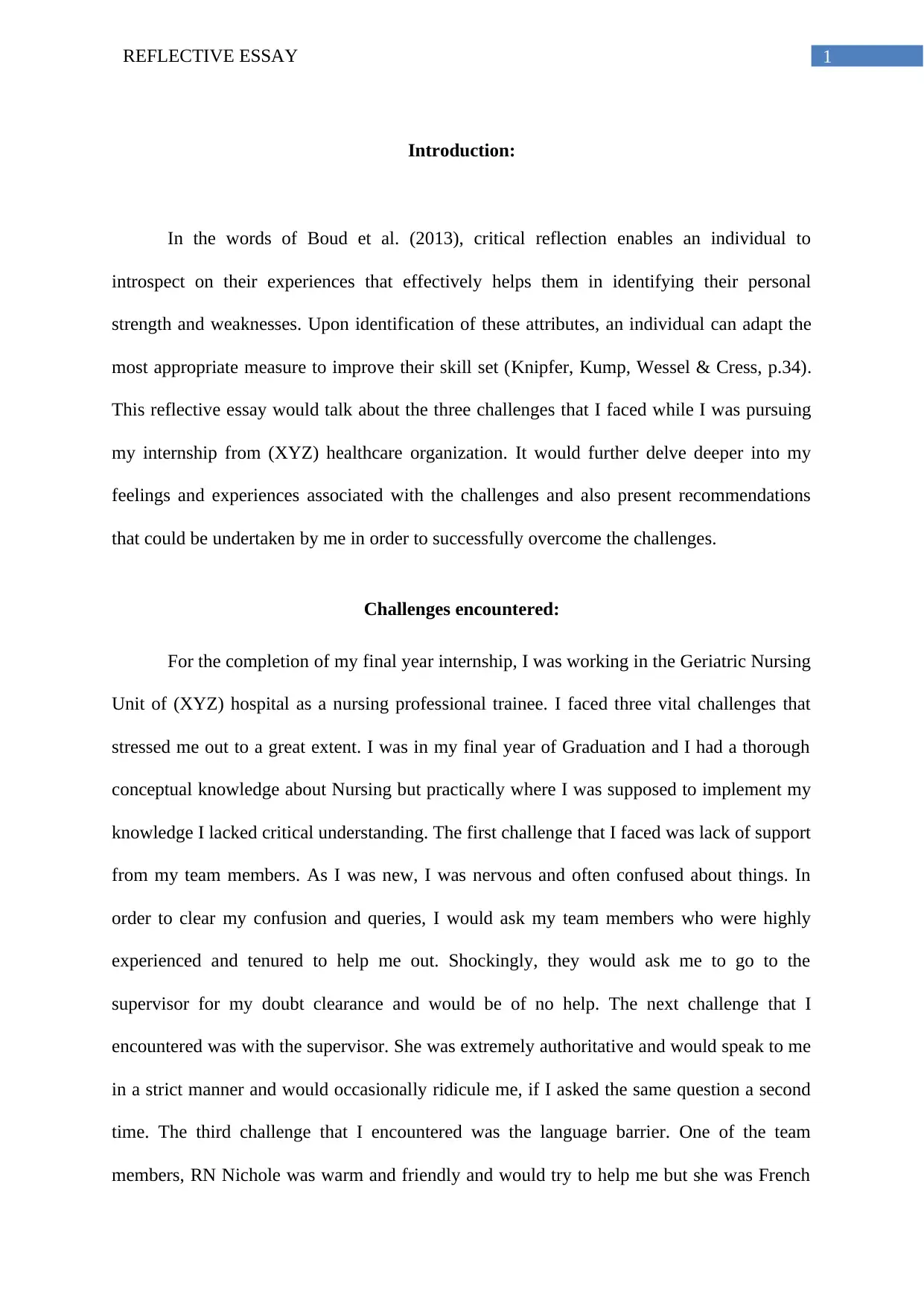
1REFLECTIVE ESSAY
Introduction:
In the words of Boud et al. (2013), critical reflection enables an individual to
introspect on their experiences that effectively helps them in identifying their personal
strength and weaknesses. Upon identification of these attributes, an individual can adapt the
most appropriate measure to improve their skill set (Knipfer, Kump, Wessel & Cress, p.34).
This reflective essay would talk about the three challenges that I faced while I was pursuing
my internship from (XYZ) healthcare organization. It would further delve deeper into my
feelings and experiences associated with the challenges and also present recommendations
that could be undertaken by me in order to successfully overcome the challenges.
Challenges encountered:
For the completion of my final year internship, I was working in the Geriatric Nursing
Unit of (XYZ) hospital as a nursing professional trainee. I faced three vital challenges that
stressed me out to a great extent. I was in my final year of Graduation and I had a thorough
conceptual knowledge about Nursing but practically where I was supposed to implement my
knowledge I lacked critical understanding. The first challenge that I faced was lack of support
from my team members. As I was new, I was nervous and often confused about things. In
order to clear my confusion and queries, I would ask my team members who were highly
experienced and tenured to help me out. Shockingly, they would ask me to go to the
supervisor for my doubt clearance and would be of no help. The next challenge that I
encountered was with the supervisor. She was extremely authoritative and would speak to me
in a strict manner and would occasionally ridicule me, if I asked the same question a second
time. The third challenge that I encountered was the language barrier. One of the team
members, RN Nichole was warm and friendly and would try to help me but she was French
Introduction:
In the words of Boud et al. (2013), critical reflection enables an individual to
introspect on their experiences that effectively helps them in identifying their personal
strength and weaknesses. Upon identification of these attributes, an individual can adapt the
most appropriate measure to improve their skill set (Knipfer, Kump, Wessel & Cress, p.34).
This reflective essay would talk about the three challenges that I faced while I was pursuing
my internship from (XYZ) healthcare organization. It would further delve deeper into my
feelings and experiences associated with the challenges and also present recommendations
that could be undertaken by me in order to successfully overcome the challenges.
Challenges encountered:
For the completion of my final year internship, I was working in the Geriatric Nursing
Unit of (XYZ) hospital as a nursing professional trainee. I faced three vital challenges that
stressed me out to a great extent. I was in my final year of Graduation and I had a thorough
conceptual knowledge about Nursing but practically where I was supposed to implement my
knowledge I lacked critical understanding. The first challenge that I faced was lack of support
from my team members. As I was new, I was nervous and often confused about things. In
order to clear my confusion and queries, I would ask my team members who were highly
experienced and tenured to help me out. Shockingly, they would ask me to go to the
supervisor for my doubt clearance and would be of no help. The next challenge that I
encountered was with the supervisor. She was extremely authoritative and would speak to me
in a strict manner and would occasionally ridicule me, if I asked the same question a second
time. The third challenge that I encountered was the language barrier. One of the team
members, RN Nichole was warm and friendly and would try to help me but she was French
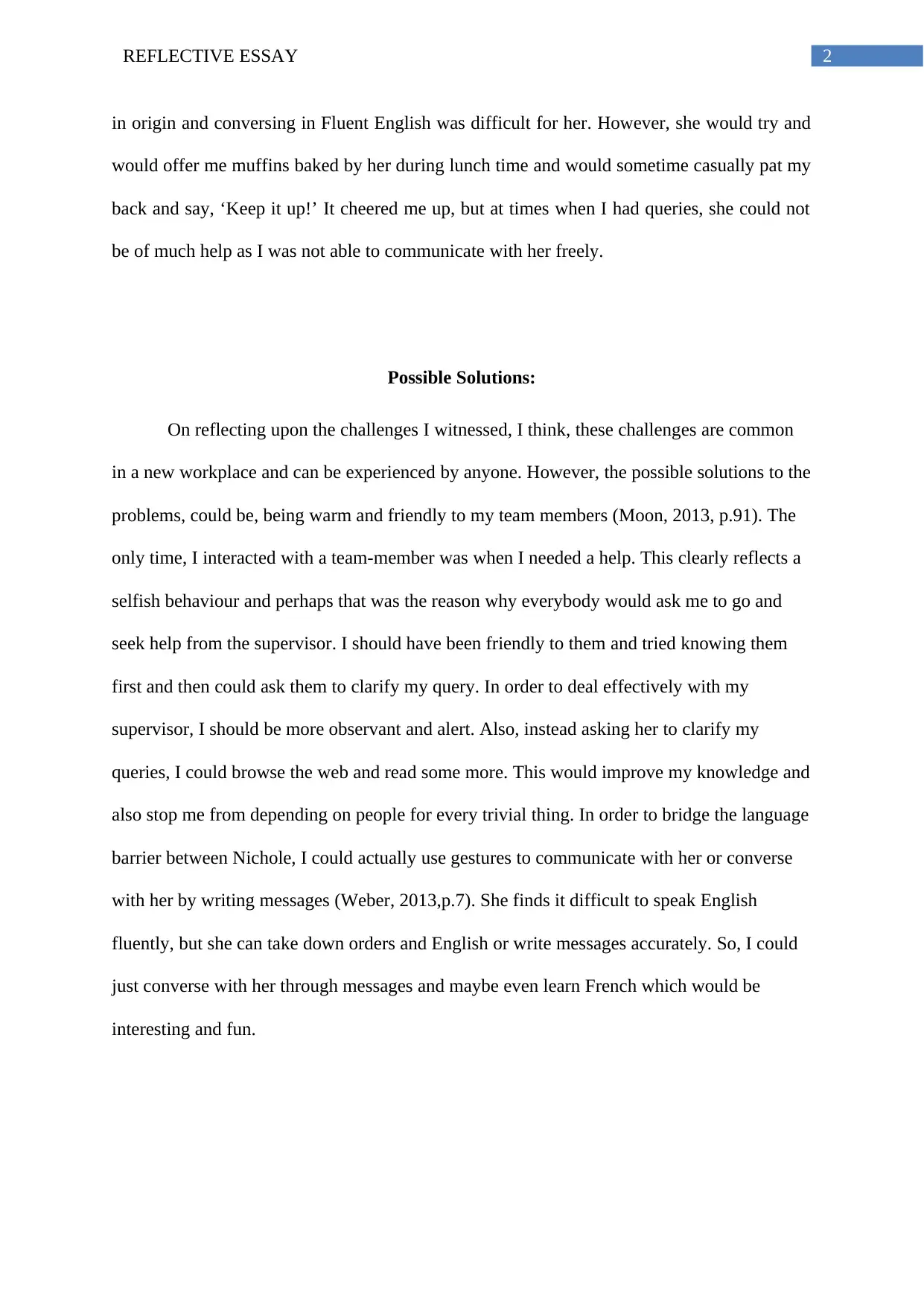
2REFLECTIVE ESSAY
in origin and conversing in Fluent English was difficult for her. However, she would try and
would offer me muffins baked by her during lunch time and would sometime casually pat my
back and say, ‘Keep it up!’ It cheered me up, but at times when I had queries, she could not
be of much help as I was not able to communicate with her freely.
Possible Solutions:
On reflecting upon the challenges I witnessed, I think, these challenges are common
in a new workplace and can be experienced by anyone. However, the possible solutions to the
problems, could be, being warm and friendly to my team members (Moon, 2013, p.91). The
only time, I interacted with a team-member was when I needed a help. This clearly reflects a
selfish behaviour and perhaps that was the reason why everybody would ask me to go and
seek help from the supervisor. I should have been friendly to them and tried knowing them
first and then could ask them to clarify my query. In order to deal effectively with my
supervisor, I should be more observant and alert. Also, instead asking her to clarify my
queries, I could browse the web and read some more. This would improve my knowledge and
also stop me from depending on people for every trivial thing. In order to bridge the language
barrier between Nichole, I could actually use gestures to communicate with her or converse
with her by writing messages (Weber, 2013,p.7). She finds it difficult to speak English
fluently, but she can take down orders and English or write messages accurately. So, I could
just converse with her through messages and maybe even learn French which would be
interesting and fun.
in origin and conversing in Fluent English was difficult for her. However, she would try and
would offer me muffins baked by her during lunch time and would sometime casually pat my
back and say, ‘Keep it up!’ It cheered me up, but at times when I had queries, she could not
be of much help as I was not able to communicate with her freely.
Possible Solutions:
On reflecting upon the challenges I witnessed, I think, these challenges are common
in a new workplace and can be experienced by anyone. However, the possible solutions to the
problems, could be, being warm and friendly to my team members (Moon, 2013, p.91). The
only time, I interacted with a team-member was when I needed a help. This clearly reflects a
selfish behaviour and perhaps that was the reason why everybody would ask me to go and
seek help from the supervisor. I should have been friendly to them and tried knowing them
first and then could ask them to clarify my query. In order to deal effectively with my
supervisor, I should be more observant and alert. Also, instead asking her to clarify my
queries, I could browse the web and read some more. This would improve my knowledge and
also stop me from depending on people for every trivial thing. In order to bridge the language
barrier between Nichole, I could actually use gestures to communicate with her or converse
with her by writing messages (Weber, 2013,p.7). She finds it difficult to speak English
fluently, but she can take down orders and English or write messages accurately. So, I could
just converse with her through messages and maybe even learn French which would be
interesting and fun.
⊘ This is a preview!⊘
Do you want full access?
Subscribe today to unlock all pages.

Trusted by 1+ million students worldwide
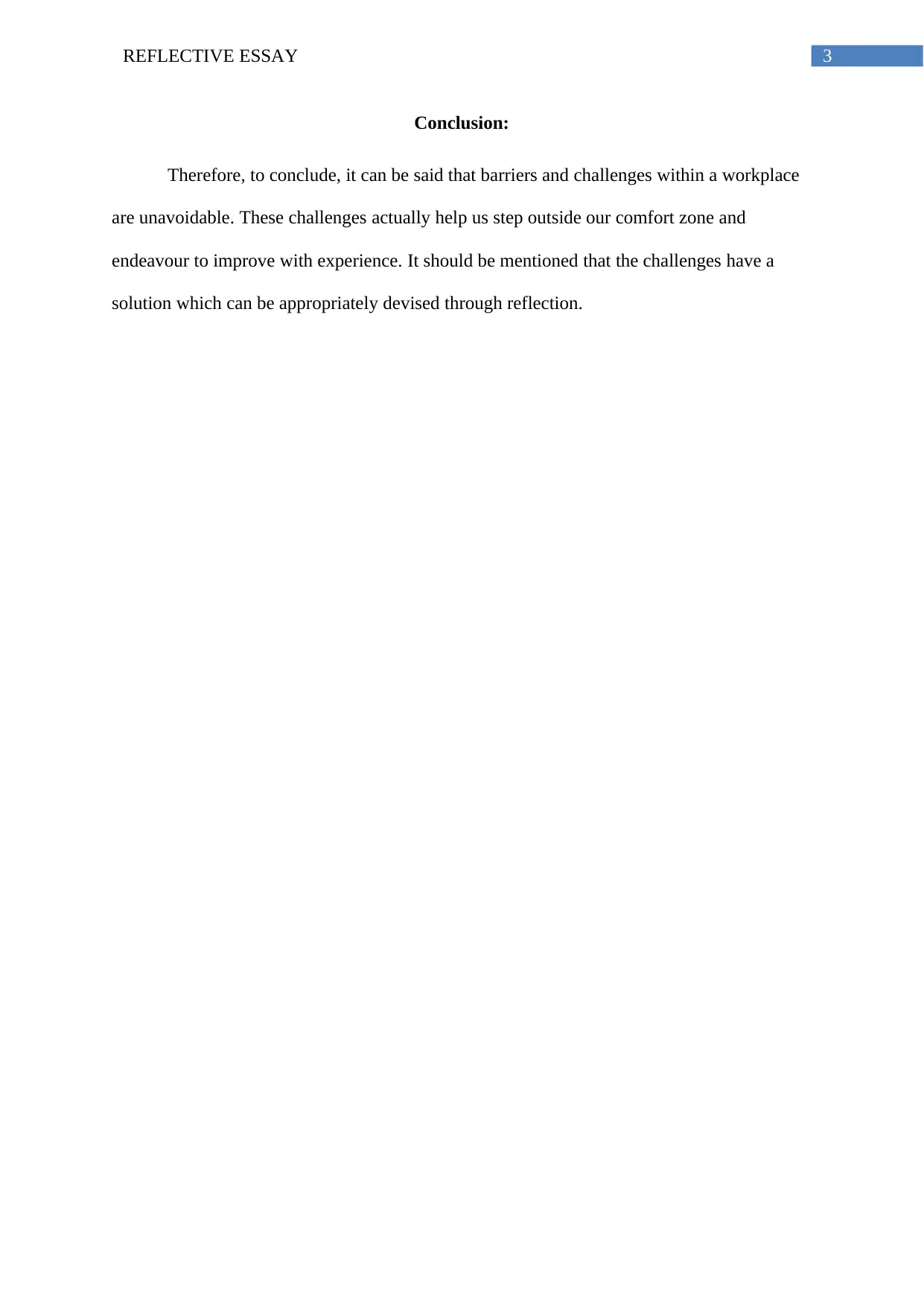
3REFLECTIVE ESSAY
Conclusion:
Therefore, to conclude, it can be said that barriers and challenges within a workplace
are unavoidable. These challenges actually help us step outside our comfort zone and
endeavour to improve with experience. It should be mentioned that the challenges have a
solution which can be appropriately devised through reflection.
Conclusion:
Therefore, to conclude, it can be said that barriers and challenges within a workplace
are unavoidable. These challenges actually help us step outside our comfort zone and
endeavour to improve with experience. It should be mentioned that the challenges have a
solution which can be appropriately devised through reflection.
Paraphrase This Document
Need a fresh take? Get an instant paraphrase of this document with our AI Paraphraser
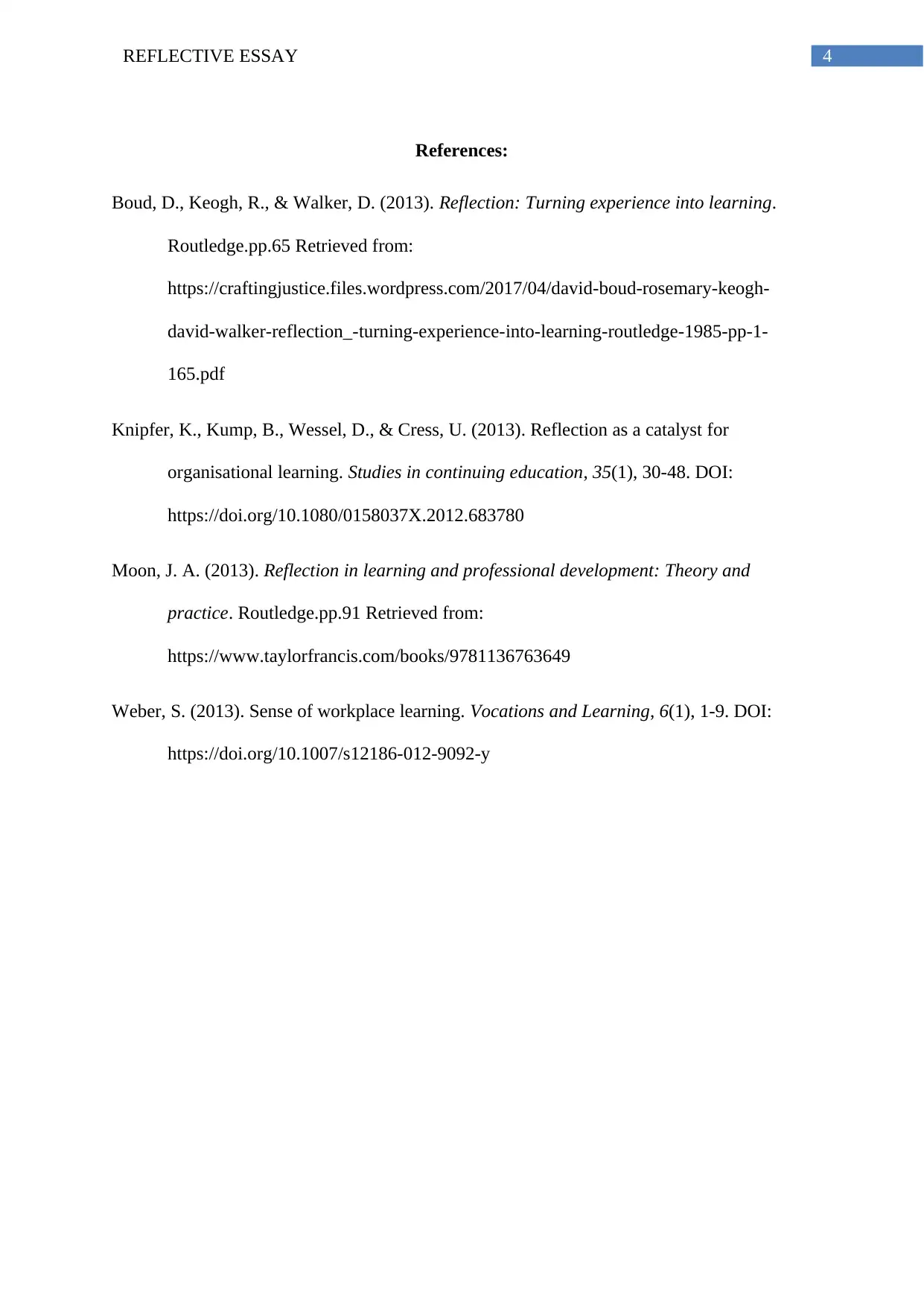
4REFLECTIVE ESSAY
References:
Boud, D., Keogh, R., & Walker, D. (2013). Reflection: Turning experience into learning.
Routledge.pp.65 Retrieved from:
https://craftingjustice.files.wordpress.com/2017/04/david-boud-rosemary-keogh-
david-walker-reflection_-turning-experience-into-learning-routledge-1985-pp-1-
165.pdf
Knipfer, K., Kump, B., Wessel, D., & Cress, U. (2013). Reflection as a catalyst for
organisational learning. Studies in continuing education, 35(1), 30-48. DOI:
https://doi.org/10.1080/0158037X.2012.683780
Moon, J. A. (2013). Reflection in learning and professional development: Theory and
practice. Routledge.pp.91 Retrieved from:
https://www.taylorfrancis.com/books/9781136763649
Weber, S. (2013). Sense of workplace learning. Vocations and Learning, 6(1), 1-9. DOI:
https://doi.org/10.1007/s12186-012-9092-y
References:
Boud, D., Keogh, R., & Walker, D. (2013). Reflection: Turning experience into learning.
Routledge.pp.65 Retrieved from:
https://craftingjustice.files.wordpress.com/2017/04/david-boud-rosemary-keogh-
david-walker-reflection_-turning-experience-into-learning-routledge-1985-pp-1-
165.pdf
Knipfer, K., Kump, B., Wessel, D., & Cress, U. (2013). Reflection as a catalyst for
organisational learning. Studies in continuing education, 35(1), 30-48. DOI:
https://doi.org/10.1080/0158037X.2012.683780
Moon, J. A. (2013). Reflection in learning and professional development: Theory and
practice. Routledge.pp.91 Retrieved from:
https://www.taylorfrancis.com/books/9781136763649
Weber, S. (2013). Sense of workplace learning. Vocations and Learning, 6(1), 1-9. DOI:
https://doi.org/10.1007/s12186-012-9092-y
1 out of 5
Related Documents
Your All-in-One AI-Powered Toolkit for Academic Success.
+13062052269
info@desklib.com
Available 24*7 on WhatsApp / Email
![[object Object]](/_next/static/media/star-bottom.7253800d.svg)
Unlock your academic potential
Copyright © 2020–2026 A2Z Services. All Rights Reserved. Developed and managed by ZUCOL.




